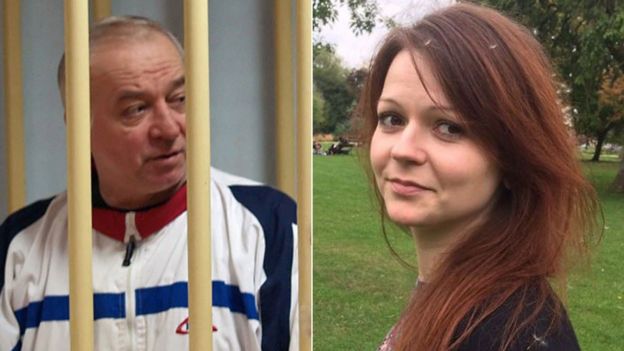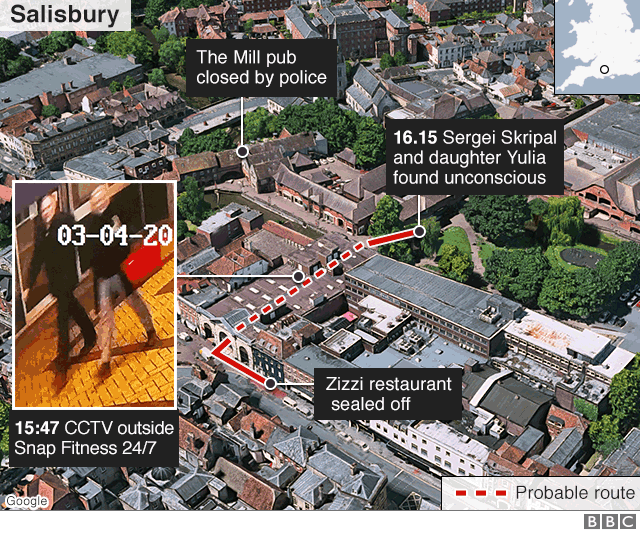Another Spurious Attempt to Besmirch Russia ...
 |
| EPA/ Yulia Skripal/Facebook
|
"It's a very unusual case, and the critical thing is to get [to] the bottom of its causes as quickly as possible."
"We're doing all the things you would expect us to do. We're speaking to witnesses We're taking forensic samples at the scene. We're doing toxicology work, and that will help us to get to an answer."
"There are deaths which attract attention. I think we have to remember that Russian exiles are not immortal, they do all die and there can be a tendency for some conspiracy theories. But likewise we have to be alive to the fact of state threats, as illustrated by the Litvinenko case."
"This is being treated as a major incident involving attempted murder, by administration of a nerve agent."
"Having established that a nerve agent is the cause of the symptoms... I can also confirm that we believe that the two people who became unwell were targeted specifically."
Mark Rowley, head of counterterrorism policing, United Kingdom
"I had hoped it never would happen again, and when I saw those pictures of special suits, of course it was quite difficult to believe it might happen again."There it is laid out in point-blank verse, the conspiracies launched by Moscow to interfere in other nations' politics represent a discrediting slander against Russia. The counterpoint issue is that nations like the United Kingdom are involved in not merely cyber plots and the use of social media for inserting Russian destabilizing content abroad, but a far more cynical ploy to use violence and murder to discredit Russia in a nefarious plan to slander Vladimir Putin and botch his chances for yet another term as President of Russia. As if.
"Because it did happen to another Russian person, it shows lessons were not learned and people asking for protection, for political asylum or refugees or even this guy, who was exchanged, they can't be safe, can't be protected."
Marina Litvinenko
"We know that this tragic situation has happened, yet we have no information about its probable causes, what this man has been doing, and what this is about."
"[However accusations against Russia are predictable, and] not long in coming."
Dmitry Peskov, spokesman, Vladimir Putin
"The Britons suffer from phobias. If something happens to a Russian, they immediately start looking for a Russian trail."
Andrey Lugovoy, former KGB bodyguard,member of Russian parliament, co-accused in Litvinenko murder
"British authorities would pursue] an anti-Russian scenario [just as was done in investigating the death of Alexander Litvinenko]."
"If someone did poison Skripal, if this is not just an accident, then, of course, this is a provocation by British special services aimed primarily at discrediting Russian government bodies in the run-up to the presidential election."
Dmitry Kovtun, businessman, co-accused in Litvinenko's death
The attempted murder of former Russian military intelligence colonel Sergei Skripal, a man charged and convicted in a Russian court of providing intelligence to Britain's MI6, alerting them to the names of Russian intelligence agents doing undercover work in Europe, along with his 33-year-old daughter, Yulia, reflects in essence and in outcome the slow and dreadful agonizing death suffered by Alexander Nitvinenko who died in 2006 in a London hospital of polonium poisoning.
It wasn't much of a stretch to link Moscow with his death since that kind of radioactive substance is not readily available to anyone independent of government sources.
Sergei Skripal lived quietly in Salisbury, after he was one of those used in a prisoner exchange between Russia and the United States, shortening his prison sentence being served in a Russian prison, for spying for the British foreign intelligence service. He was handed to Britain in 2010, representing one of four Russian prisoners in exchange for ten Russian sleeper agents whose presence in the United States was revealed as long-term agents posing as ordinary Americans with what was revealed to be false identities, some with children born in the U.S. believing themselves to be American.
Sergei Skripal, 66, was seen on a park bench, his daughter slumped beside him, both in perilous condition. Two of the first responders on the scene after a woman passerby in the park reported their condition to authorities, appear to have been affected by the same poisonous agent and were hospitalized with breathing problems. It seemed, said Freya Church, as though they had taken "something quite strong. On the bench there was a couple, an older guy and a younger girl. She was sort of leaned in on him. It looked like she had passed out, maybe. He was doing some strange hand movements, looking up to the sky", she told the BBC.
In 2016 a British government inquiry produced a 300-page document with the finding that Russian President Vladimir Putin had "probably approved" the killing of Alexander Litvinenko, an outspoken critic of the Kremlin, as a former KGB operative. Two Russians were accused of responsibility in administering the substance that eventually killed Litvinenko, after he spent three weeks in hospital slowly dying. Russia refused to hand the two, Andrey Lugovoy and Dmitry Kovtun, over to Britain; both denied any involvement.
On his release to Britain, Sergei Skripal remained out of the public eye, living quietly in Salisbury. On Sunday he and his daughter had gone to a restaurant. That restaurant and a pub alongside nearby sites were being swept for forensic evidence. A CCTV security camera showed father and daughter walking along together appearing healthy and normal. A short time later, they were both in critical condition.
When the call went out to police that two people appeared unwell, and it was discovered who they were, security circles became alarmed.
Boris Johnson, Britain's Foreign Secretary, has stated that though it would be "wrong to pre-judge" the investigation, that if Russia were to be discovered to be the responsible agent to the drama that has left the two in intensive care, being treated for "suspected exposure to an unknown substance", it could be expected that the British government would respond "robustly". And do what? is the puzzle in this conundrum.

Labels: Espionage, Great Britain, Murder, Russia

<< Home